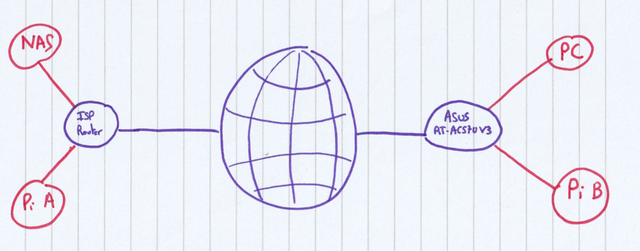Hi SNB community ! 
SITUATION:

Physical location A (1000 Mbps up and down)
- ISP provider classic router
- NAS
- Raspberry Pi 4B (2GB RAM)
Physical location B (1000Mbps up and down)
- Asus RT-AC57U V3
- PC
- Raspberry Pi 4B (2GB RAM)
Wireguard is setup on both Raspberry with PiVPN and they can communicate together. My computer access the NAS through the wireguard tunnel. One static route is defined on the Asus router to redirect requests from PC to the Raspberry which send it in the tunnel. I choosed to have two Raspberries to avoid hosting the Wireguard client on my Asus router and potentially being CPU bottlenecked. But no luck here...
ISSUE:
I identified that NAT acceleration which seems to be an old hardware process on the RT-AC57U is causing wireguard speed throttle. Typically, when I start a file transfer, the speed hits 280Mbps, then fall and stabilize around 100Mbps. I tried to disable NAT acceleration which causes the router's CPU to handle the traffic. As RT-AC57U's CPU is weak, it runs at 100%. The transfer speed is constant and equal to 160Mbps. My ASUS router is here to replace my ISP router in location B which does not support Static routing. When using this bad ISP router, the transfer speed between my PC and NAS through WG tunnel is 800Mbps. Now I am sure that the ASUS router is limiting the speed.
WHAT I LOOK FOR
As the encryption is achieved by both raspberrys, which router (ASUS preffered... ) should I buy to avoid this "NAT acceleration" issue and benefit from the full speed (at least 800Mbps) between my PC and NAS ?
Is NAT acceleration still an issue with 2023's routers ? I heard it's an old technology which was replaced by something called "flow cache"
Is it necessary to have an RT-AX88U Pro or any similar high end router ? Or any basic 2023 router will work ?
I don't understand why wireguard speed is throttled by the ASUS router whereas executing a simple network speed test from the PC gives 1000Mbps up and down... If the router can handle 1000Mbps to download something from the web, why is it different for wireguard's packets ?
Thanks !!!
SITUATION:

Physical location A (1000 Mbps up and down)
- ISP provider classic router
- NAS
- Raspberry Pi 4B (2GB RAM)
Physical location B (1000Mbps up and down)
- Asus RT-AC57U V3
- PC
- Raspberry Pi 4B (2GB RAM)
Wireguard is setup on both Raspberry with PiVPN and they can communicate together. My computer access the NAS through the wireguard tunnel. One static route is defined on the Asus router to redirect requests from PC to the Raspberry which send it in the tunnel. I choosed to have two Raspberries to avoid hosting the Wireguard client on my Asus router and potentially being CPU bottlenecked. But no luck here...
ISSUE:
I identified that NAT acceleration which seems to be an old hardware process on the RT-AC57U is causing wireguard speed throttle. Typically, when I start a file transfer, the speed hits 280Mbps, then fall and stabilize around 100Mbps. I tried to disable NAT acceleration which causes the router's CPU to handle the traffic. As RT-AC57U's CPU is weak, it runs at 100%. The transfer speed is constant and equal to 160Mbps. My ASUS router is here to replace my ISP router in location B which does not support Static routing. When using this bad ISP router, the transfer speed between my PC and NAS through WG tunnel is 800Mbps. Now I am sure that the ASUS router is limiting the speed.
WHAT I LOOK FOR
As the encryption is achieved by both raspberrys, which router (ASUS preffered... ) should I buy to avoid this "NAT acceleration" issue and benefit from the full speed (at least 800Mbps) between my PC and NAS ?
Is NAT acceleration still an issue with 2023's routers ? I heard it's an old technology which was replaced by something called "flow cache"
Is it necessary to have an RT-AX88U Pro or any similar high end router ? Or any basic 2023 router will work ?
I don't understand why wireguard speed is throttled by the ASUS router whereas executing a simple network speed test from the PC gives 1000Mbps up and down... If the router can handle 1000Mbps to download something from the web, why is it different for wireguard's packets ?
Thanks !!!

